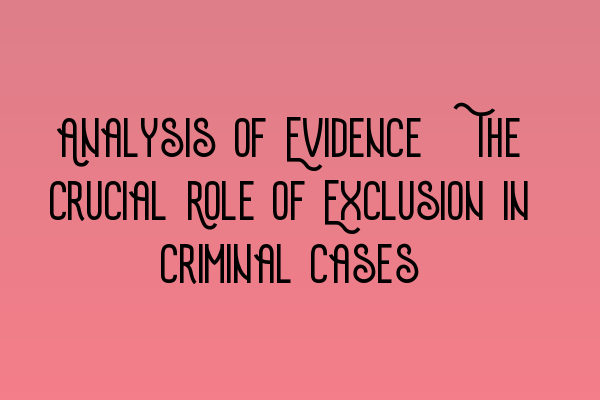Analysis of Evidence: The Crucial Role of Exclusion in Criminal Cases
When it comes to criminal cases, the analysis of evidence plays a crucial role in determining the guilt or innocence of a defendant. One key aspect of this analysis is the process of exclusion. Exclusion refers to the removal of evidence that is deemed unreliable, irrelevant, or obtained illegally, from consideration in a trial. In this blog post, we will explore the significance of exclusion in criminal cases and its impact on the overall outcome.
The Importance of Evidence in Criminal Cases
Evidence forms the foundation of any criminal case. It provides the factual basis upon which decisions are made and justice is served. However, not all evidence is admissible in court. The legal system recognizes that certain types of evidence may be unreliable or unfairly prejudicial, and therefore, should not be considered.
Exclusionary rules are in place to protect defendants’ rights and ensure that the evidence being presented is fair and reliable. These rules are derived from various sources, such as statutes, case law, and constitutional provisions. The purpose of exclusion is to maintain the integrity and fairness of the criminal justice system.
The Role of Exclusion in Criminal Cases
Exclusion serves several important functions in criminal cases. Firstly, it acts as a safeguard against illegal searches and seizures. The Fourth Amendment of the United States Constitution, for example, protects individuals from unreasonable searches and seizures by law enforcement. Any evidence obtained in violation of this right is considered fruit of the poisonous tree and must be excluded from trial.
Secondly, exclusion prevents the introduction of unreliable or hearsay evidence. Hearsay refers to an out-of-court statement offered to prove the truth of the matter asserted. Such evidence is often considered inadmissible due to its potential lack of reliability. The exclusion of hearsay evidence ensures that only direct and credible evidence is presented to the jury.
Thirdly, exclusion helps maintain the fairness of the trial process. If evidence that is unfairly prejudicial or substantially more prejudicial than probative is allowed, it can influence the jury’s decision in an unjust manner. By excluding such evidence, the court ensures that parties are not unfairly prejudiced and that the trial remains balanced and objective.
Factors Affecting Exclusion
Various factors may influence the decision of whether to exclude evidence in a criminal case. Some key factors include:
- The manner in which the evidence was obtained
- The credibility and reliability of the evidence
- The constitutional and statutory provisions applicable to the case
- The potential impact of the evidence on the fairness of the trial
It is important for legal professionals to thoroughly assess and analyze the evidence in order to determine its admissibility. This requires a deep understanding of the relevant laws and precedents, as well as the ability to effectively argue for or against the inclusion of specific evidence.
Conclusion
In conclusion, exclusion plays a crucial role in criminal cases by ensuring the fairness and reliability of the evidence presented in court. By excluding evidence that is obtained illegally, unreliable, or unfairly prejudicial, the court protects defendants’ rights and maintains the integrity of the criminal justice system. Legal professionals involved in criminal cases must have a thorough understanding of the principles of exclusion and the factors that influence its application.
To further enhance your understanding of criminal law and practice, consider exploring our related articles:
